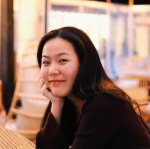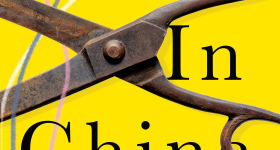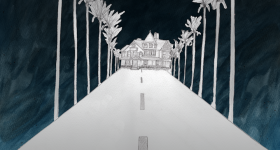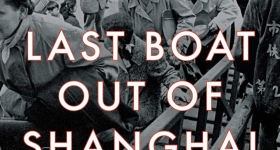Sometimes I forget that for the vast majority of my life, I hated my eyes. It was a powerful kind of hate: subtle, yet all-encompassing. I did not have to consciously think the words: I hate my eyes, I hate how small they are, too skinny and slanted, just like they say, no eyelashes, no heavy eyelids, can I even convey expression through these eyes that are so, so small? Rarely would these thoughts cross my mind in such a steady stream. Rather, they were part of the jumbled and incohesive messaging that constructed my inner dialogue, thoughts that informed my very being and whatever small perceptions I held of myself as an adolescent.
--
The first time I saw an Asian woman I was attracted to, I was 15 years old. It was in World History class, which was taught by the same white woman who also taught a class called Asian Studies. In both classes, this teacher — let’s call her Ms. Troy — spent an inordinate amount of time on East Asian history over other cultures.
Ms. Troy prattled on year in and year out about her two years living and teaching in Japan. She shared with us how enraptured she felt by the culture, and this bled into her teaching methods. We sang Sakura, Sakura, a traditional folk song dedicated to the cherry blossom, each spring; we watched Grave of the Fireflies, our introduction to the horrors Japan faced during and after World War II. She explained with equal parts fervor, fear and pride how Japanese was the hardest language to learn in the world. Ms. Troy was clearly telling the truth: she was in love with this country and its history, which was interesting and refreshing from other teachers’ European-focused lens. Sometimes she would bemoan, half-jokingly, how she wished she were ethnically Japanese.
“I never meant to go to Japan or get involved there,” Ms. Troy would tell us. “I always thought I’d be another type of teacher. But in college, there was one semester where I had to take an extra elective to earn enough credits, and this Japanese culture course was the only thing that fit into my schedule. That elective changed my life, and I never looked back.”
It was a beautiful story, to find your life’s mission in the most unexpected of places. It gave us hope that the start of our own lives could be just around the corner.
Sometimes Ms. Troy would give extra attention to her few Asian students.
“Your family is from Japan?” She asked Mindy one day, in front of the entire class.
“Just my mother’s side,” Mindy clarified, smiling at our teacher.
“Which part? Around Tokyo?” Ms. Troy pressed.
“No, actually, it’s just a small town in the North,” Mindy said, still in a friendly, conversational tone.
“Oh? Is it near Niigata? You know we have an exchange program with a high school there! When I used to live there it was the most beautiful place, I used to walk around —”
Mindy’s smile faltered. “Oh, it’s actually further north. ...”
Mindy seemed happy enough to talk about her family’s background in front of the whole room, no less, but I wasn’t sure how she actually felt inside. Something about the whole interaction felt like a performance, one that Mindy hadn’t asked to participate in but one she was roped into nonetheless. Or maybe it was all in my head, and Mindy’s smile was as real as it appeared.
Ms. Troy seemed like a relatively kind and good woman. She showed myself and others there exists a world beyond Europe and America. She taught us things I doubt other teachers across the country even knew, let alone bothered relaying to their students.
I sat in World History class day in and day out, unsure if I should feel flattered by the extra attention bestowed upon me due to a face of which I had no control over, or … what was the alternative to flattery? Discomfort? Disgust? Was such attention even stranger, more unwarranted and alienating, than the blank stares of those who pretended I didn’t exist at all? I was unsure then. I’m still unsure now.
--
Growing up one of the few people of color in a small white town, I was torn with how things like this should affect me. People saw faces like mine and either made it obvious they noticed but pretended not to notice and henceforth ignored me completely, therefore provoking shame. Or the pendulum swung the other way and people paid extra-special attention to me because they wanted to talk only about race and about Asian beauty and Asian fetishes.
In high school, when romance seemed a far-off dream for me, there was one summer between junior and senior year when a white boy named Connor paid me extra attention, and it felt like every summer romance I’d dreamed. We snuck out of our houses to meet each other at night, took long drives around our too-small town, held hands along the deserted train tracks by the river. When I told him I liked the watch around his wrist, he took it off and gave it to me, and I wore it every day for the rest of summer.
I knew he’d been with a couple of Asian girls in the past, but never thought too much of it. If anything, given my town’s excessive whiteness, it almost seemed like a good sign that I wasn’t his “first” Asian girl.
But after that summer, after he went on to college and continued to boast about how he only dated Asian women, after I stalked his social media and found him posing, peace signs flashing, with multiple girls on his trips to China and Japan, after he changed his bio to include his Japanese name, I knew it had never mattered to him what we’d done together. I could have been replaced by any of the girls in his photos and he wouldn’t have noticed.
The only plus side to this, perhaps, is that because I experienced it at a young age, I learned to recognize the warning signs. I’m prepared to deal with it when it comes up in my adult dating life now. Though of course, in an ideal world, I wouldn’t have to deal with it — the yellow fever, the racism — at all.
--
It was in World History class where I fell into a YouTube spiral and discovered something that would change my life. “It” was K-pop, a term I’d never heard of, filled with people I never thought could be at the forefront of entertainment anywhere. I stared at my screen incredulously as HyunA danced like no one was watching in “Bubble Pop” and G.NA swung her arms around on tables in “Black and White.” I replayed these videos in secret, over and over again in the back of class, and then over and over again in my bed later that night. I clung greedily to the images until my eyes were sore the next day, shrinking ever smaller in their soreness. By then I didn’t even care about the shape of my eyes; I was too busy absorbing the energy of Asia’s most coveted superstars.
For all of the hundreds of hours I’d sat and listened to Ms. Troy drone on about how Asian cultures had done this and that, it was here, in K-pop music videos of all places, that I realized there truly was a whole other world out there. A world where I could be more than just the “nice” Asian girl with the “sweet” personality. I could be empowered if I wanted to be. I could be pretty, desirable, even sexy. I never realized how much I yearned to see a face like mine reflected in the media until I actually saw it there, and that’s when the questions started. What did having this face and this body in a country that automatically judged and made assumptions about them mean for me, for all of us? What did being Asian American mean to me? I’d never thought to ask myself such questions before, but now they fell upon me, in droves.
When I was very young, I remember seeing a photo of an Asian woman with hoop earrings and thinking she was the most beautiful woman in the world. As I got older, however, whiteness replaced every beauty standard in my head. My family’s whiteness also provided no mirrors in which to see myself.
It was K-pop that reignited my appreciation for Asian bodies. The catchy tunes! The stylish outfits! These women were not boxed into “Smart Asian” or “Athletic Asian” or “Too Asian” or “Not Asian Enough” because they could be whoever they damn wanted to be. No one was questioning their right to exist as leading figures in the entertainment industry. They were stars across the sea, but it didn’t matter how far they were: K-pop had brought me closer than I’d ever felt, at that point in my life, to Asian pride.
--
They — my eyes — were my answer to why I’d never had a romantic partner or ascended in popularity, why I felt simultaneously hyper-conscious of my body and painfully invisible throughout my 18 years of being the Asian square peg in the circle of my all-white family, my all-white small town. These eyes marked me as irrevocably different, no matter how hard I yearned to be the same as everyone else.
When my closest girlfriends and I bemoaned our lack of romantic affections, a friend tried to console me by saying, “I admit, certain guys won’t be attracted to Asian girls, but at least whoever you’re with will like you for who you are.” It felt like a punch to the gut, but I smiled and accepted it as an obvious truth that everyone knew but only she was brave enough to say aloud. It seemed like a given that no one would be attracted to me for my looks alone. They would have to be “different,” because they liked a girl who was “different,” even if the differences were tissue-paper, superficially thin. It didn’t matter if I was the most American personality they’d ever met. I would still always be different, which some people just “wouldn’t go for.”
It was as innocent as it was insidious, this internalized racism and hatred that I never identified until I left the town I’d grown up in. I went to New York City, where suddenly I was surrounded by the most beautiful Asians I’d ever seen outside of a TV screen. People with eyes, skin and hair like mine who looked beautiful and desirable but, most importantly, like their own person. These women had style and confidence — things I couldn’t quite imagine Asian Americans having, let alone me. I know this sounds like a hyperbolic way of speaking. Believe me, I wish it were.
--
During my sophomore year in college, I worked up to 30 hours a week as a waitress and barista at an Italian café in the Bronx. It was actually more Albanian than Italian, but I wouldn’t know that until later, when they closed for good. My “boss” Chris was only a few years older than me, tall and handsome in that vaguely European way.
It was dark outside, sometime in late winter, which meant it was slow as hell. I amused myself to pass the time: sweeping clean floors, dusting display windows that had already been scrubbed twice. He was, as usual, doing nothing but leaning against the counter playing with his phone. The picture of I-don’t-give-a-shit, or at least, I’m-trying-really-hard-to-look-like-I-don’t-give-a-shit, which for some reason I was attracted to at that time. I tried to get past him to get to the other cases around the counter.
In one fast, fluid motion, his arms bolted out to stop me. I yelped, lips curled in mock-disdain. This was how it was, him and I. All snarl and sass with the occasional sweetness thrown in.
“Chris, please move. I have things to do.” I swatted at him with my towel.
He folded his hands across his chest, making a big show of ignoring me. I mimicked his stance to show that fine, I wasn’t going anywhere either. We had the rest of the night, after all. It didn’t even matter — I’d already cleaned that case three times — but I was not about to continue to stand there, feeling antsy with his eyes on me.
He looked at me for a second longer, then went back to his phone
“Christopher,” I sighed, abruptly exasperated with our game. “What is your problem?”
He smirked at me, which only infuriated me further.
“You know, don’t you?” He said, waving his hand in a circle around my face.
“Can you please move?”
“I can’t get any work done here, and neither can you.”
I blinked up at him.
“Your eyes,” he said, pointing. “You have such beautiful eyes.”
I scoffed at him, but on the inside I was melting. Was he being serious? Did he really think my eyes could be beautiful?
I carried that compliment with me for weeks, even after we turned away from each other that night and it was never mentioned again. This seemed like the validation I’d been looking for, though now I realize: the point wasn’t that one hot guy told me I was pretty and suddenly my self-delusions went away. That this happened during work hours was also cringey to me. At the time, though, it felt like an affirmation I took from someone else gratefully.
It took a few more years to realize I didn’t need anyone else’s affirmations. The only ones that really mattered were my own.
--
The first time I felt wholly, desirably, shamelessly mine: when I moved to Manhattan’s Chinatown and passed faces like mine every day. Seeing all the joy, sadness, laughter, love our faces give. The expressions our eyes convey.
It has taken 23 years, and the journey continues every day. Some questions have been answered, but a floodgate of new ones has opened. While I’ve come to better terms with my physicality, I still struggle not to be defined by it. Life is not all about race, but race inadvertently affects life. It is futile to deny it.
I spent the first 18 years of my life hating my eyes, hating what made me different. I used to look in the mirror and see eyes that were too small, even if no one said so directly to my face. For a while I even avoided laughing, scared that my eyes would shrink even smaller in my face, until I realized how deeply sad that sentiment was.
Now, I love my short lashes that flutter softly. I love the deep warmth in my brown irises.
That’s another thing I’d gotten wrong about myself in the past: my eyes are not black. I used to avoid mirrors so much I didn’t even know my eye color. My pupils are dark brown, sure, but my irises are not. They are a light brown that delights me, in sunlight and shadows, with makeup or no makeup.
It is a fine line between wanting to feel seen and wanting to simply fit in. For so long I focused my energy on the most superficial of things: my body, my face and how it was perceived by others. Now I look forward, not to how others see me, but to how I wish to see and express myself — whether it is through how I present myself physically or the thoughts I finally feel confident enough to share.










Comments